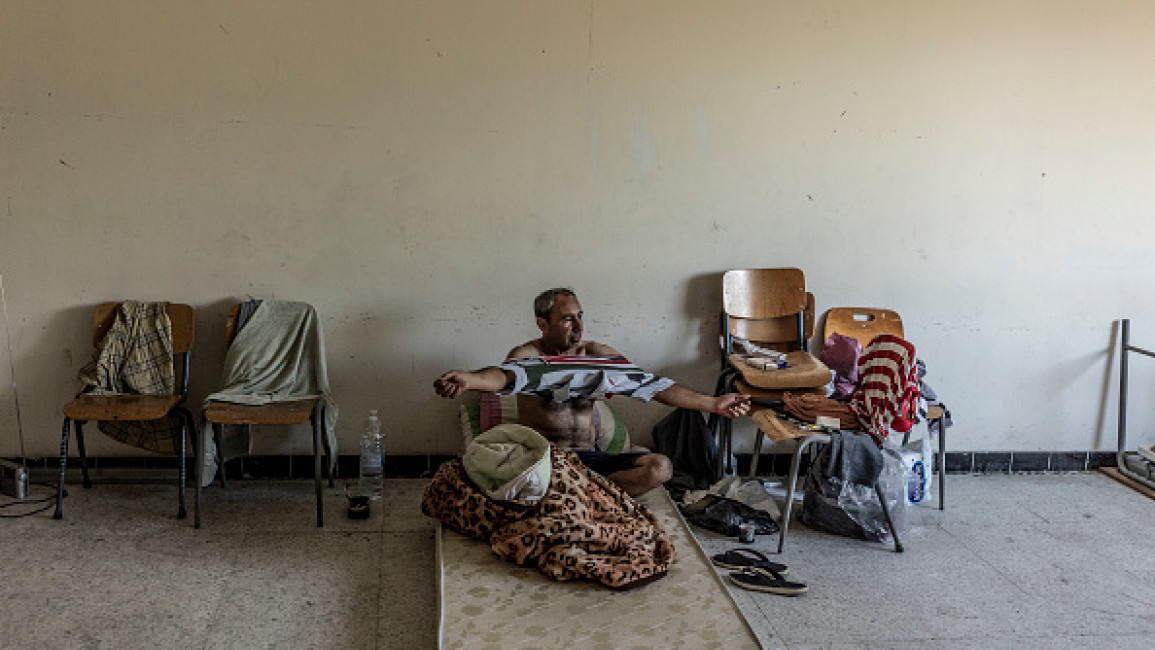Syrians displaced by Lebanese border clashes suffer from lack of support, racism
Lebanon's Access Center for Human Rights condemned on Monday, 31 October, the Lebanese government's "discrimination" against Syrian refugees who have been displaced by clashes between Israel and Hezbollah in southern Lebanon.
Lebanese Minister of Social Affairs Hector Hajjar said on 28 October that "we cannot welcome Syrian refugees, not in schools nor in state institutions, because they will not leave when the situation returns to normal."
The minister's comments come as 29,000 have fled the Lebanese border regions, where fighting between Israel, Hezbollah, and allied Palestinian groups has been steadily escalating since 8 October.
Syrians fleeing the border fighting, already among the poorest in the poverty-stricken country, have had to fend for themselves amid a lack of state support and increasing anti-Syrian racism.
"The children got scared by the sound of the shelling, so we had to leave with just the clothes on our backs. We took a [US$22] loan from our landlord so we could afford the trip," Fatimah*, a Syrian refugee and mother of four children from the town of Mansouri, told The New Arab.
Fatimah and her children first fled to an informal refugee camp near the city of Kaab Elias in the Bekaa valley but could not find shelter, so they returned back to Mansouri. Three days after their return, shelling resumed, so they fled to Beirut, where they continued to struggle to find housing.
Other Syrian refugees have had to accommodate their relatives in what are already dismal conditions, unable to leave their families out in the cold.
Warda*, a Syrian refugee living in a tent in Kaab Elias, told TNA that she has hosted her extended family, who fled southern Lebanon for over two weeks. There are currently fourteen people living in her tent, originally designed for a single family.
Restrictive policies, paranoia, racism
Several Lebanese municipalities in the Bekaa and southern Lebanon have adopted restrictive policies towards Syrian refugees and have directed services towards displaced Lebanese rather than Syrians.
In Kaab Elias, at least seven Syrian families who were originally displaced by fighting from the border have returned to the border or are preparing to do so – despite the escalating danger.
"The Municipalities are preventing organisations from helping Syrians in informal settlements in the Bekaa. Syrians are also frightened by authorities for fear of deportation," Ahmad*, an activist in the Bekaa who documented the return of the seven families, told TNA.
Movement of Syrian refugees in the south has also been restricted, with border towns like Rmeish and Ein el-Ebel organising night-time vigilante patrols to prevent Syrians coming in search of shelter.
Rmeish was a safe zone in the 2006 Israel-Hezbollah war, sheltering over 20,000 displaced people. Residents of the town have said they are once again ready to welcome "any Lebanese with open arms" but have expressed reservations about allowing Syrians to enter the town.
"If Syrians were to come here and occupy our houses, we wouldn't be able to remove them," Najib al-Ameel, a Maronite priest in Rmeish, told TNA.
Lebanese social media users have warned against the movement of Syrians in the south, with posts describing the movement of displaced Syrians as an "invasion."
News of Syrians acting as supposed spies on behalf of Israel has also spread on social media, leading to the expulsion of some Syrians from towns such as Rmeish and Bint Jbeil.
Fear of deportation has prevented Syrians from coordinating with authorities and accessing resources that are available for them.
Several displaced Syrians told TNA that they did not seek shelter in the southern city of Sour, despite it being the closest to them, because they heard that shelters there were not accepting Syrians.
According to the head of the municipalities of Sour, Hassan Dbouk, shelters accepted over 100 Syrians in the first days of the border clashes, but they left after seeing police officers conducting patrols nearby.
Since then, "not one Syrian has come to the shelter," Dbouk said.
*pseudonyms used to protect the identities of interviewees.



